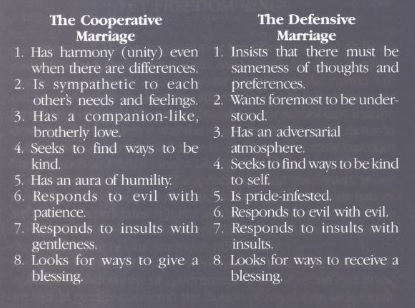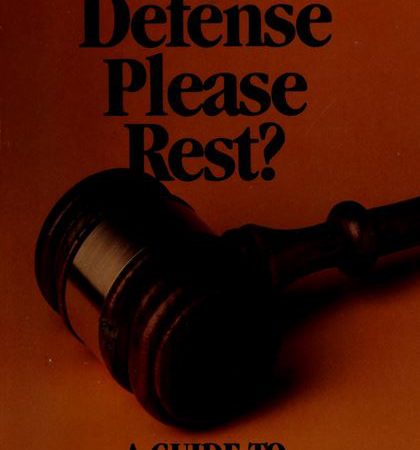This book is a great read for dealing with communication styles in friendships, relationships and marriage. It points out the different ways we can get defensive with each other. Dr. Carter points out the things we can do in communicating that can cause others to be defensive. While he does quote the bible, and some may not believe, the main content in the book can help all relationships. Here are some notes I took while reading the book.
Patterns of Defensiveness
- Prosecutor – Prosecutor – Where both parties argue their side of the story
- Prosecutor – Defender – Opposite personalities – one complains or pleads their case and the other avoids or defends
- Defender – Defender – Usually both parties avoid each other, keep feelings to selves and rarely resolve anything
Defensiveness is a choice. You can actually create defensiveness in your partner:
- Have a long list of expectations
- Assume all anger is bad and that you should never disagree
- Use the word “you” frequently, especially in disagreements
- Keep Secrets
- Worry what others might think about you
- Legalistic religious beliefs
- Sidestep feedback from others – shun constructive suggestions
- Hold firmly to traditions – keeping controlled and predictable
- Laziness
- Conditional Acceptance of others
- Loss of compassion due to holding onto strong sense of right and wrong
Dr. Carter uses a lot of case examples to show how each of these techniques happen in relationships. It’s helpful to have real examples to understand his point.
There’s a quiz of 60 questions to help you determine how defensive you are in relationships. The quiz is to help you with self-awareness so you can take corrective measures if necessary.
Dr. Carter breaks defensiveness into three categories:
- Denial
- Rationalization
- Projection
- Magical Thinking
- Pretending everything is perfect
- Playing incompetent
- Ignoring negative side of life
- Countering and invalidating
- “Know it all” attitude
- Boomerang – throwing attention back on the other person
- “What about you”
- Blaming
- Bringing up the past
- Being a dictator
- “If Only”
- Evasive – ignoring the problems
- Clamming up
- Changing the subject
- “I don’t care”
- Hiding out
- Being snobbish
- Being lazy
These defensive behaviors turn into defensive patterns
- Always apologizing
- Being super friendly
- Laying low
- Always criticizing
- Being skeptical
- Fussing over things
- Martyr
- Rebel
- Worrier
- Overly Emotional
- Bossy
Causes of Defensiveness
- Fragile Ego
- Self image low
- Overemphasis on personal needs
- Fear of being vulnerable
- Reactor (rather than initiator)
- Need for power
Defensiveness can follow when we are being judged or are judgemental. This includes performance, emotional and religious judgements. Rather than being evaluative with each other, be descriptive with your speech. This keeps judgement out of the picture.
Instead of saying “Don’t you know how wrong you are?” say “I’d like to try to understand…” Try and see things from each other’s side.
Dr. Carter states, “Couples who wish to exchange thoughts and feelings constructively will remind themselves that their words will have a great impact when they are conveyed within an attitude of respect.” Being descriptive with your words shows the other person that they are worth proper treatment and allow for deeper communication.
In the next section, Dr. Carter goes into the functions and uses of anger.
- Agressive Anger
- Open hostile agression
- Open cutting behavior
- Passive-agressive anger
- Assertive Anger
- “Taking a stand for ones needs, worth or convictions while, at the same time, having a consideration and sensitivity for the others’ feelings.”
Samples of assertiveness:
- State opinions and preferences tactfully
- Say “no” when you need to
- Family priorities and sticking to them
- Asking for help with chores
- Doing favors for yourself
- Asking questions when you need clarity
- Setting stipulations and boundaries
- Calling a truce when emotions are too intense
- Taking a break when overloaded
- Firm but gentle expression of your feelings and needs
My favorite part of the book was the section on myths.
- A harmonious marriage is one in which there are no problems
- Everyone should know what a good husband or wife is
- A good marriage should just happen without strenuous amounts of work
- If spouses love each other, the sexual aspect of marriage will take care of itself
- Honesty is always the best policy
- Spouses should always enjoy the same activities and should spend most of their free time together
- When the romance is gone, the love left is no good
- When anger is felt, it means that the relationship is a sour one
- Marriage should be the ultimate cure for lonliness
- When something goes wrong in the marriage, someone should be blamed
Characteristics for successful relationships
- Harmonious
- You are different but you can work together
- Sympathetic
- In touch with your own feelings
- Empathetic of your spouse’s feelings
- Brotherly
- Kindhearted
- Humble
- Not returning evil for evil or insult for insult

Dr. Carter offers a formula for obtaining harmony in your relationships.
- Develop a reputation as an encourager
- Offer acceptance even in disagreements
- Avoid the abuse of the word You
- Share understanding before offering solutions
- Learn to say “you’re right”
- Avoid pleading, convincing or coaxing
- Set time aside to share personal issues
- When discussing problems, keep their importance in perspective
- Look for creative ways to express love
- Live with your spouse as unto the Lord
Link to book Open Library: https://archive.org/stream/willdefensepleas00cart
